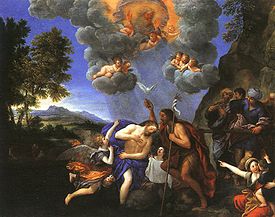- Matthew 3:17
-
 Francesco Albani's The Baptism of Christ
Francesco Albani's The Baptism of Christ Listen to this article (info/dl)
Listen to this article (info/dl)
This audio file was created from a revision of Matthew 3:17 dated 2005-12-10, and does not reflect subsequent edits to the article. (Audio help)More spoken articlesMatthew 3:17 is the seventeenth, and final, verse of the third chapter of the Gospel of Matthew in the New Testament. Jesus has just been baptized by John the Baptist and in this verse God announces that Jesus is his son.
In the King James Version of the Bible the text reads:
- And lo a voice from heaven,
- saying, This is my beloved
- Son, in whom I am well pleased.
The World English Bible translates the passage as:
- Behold, a voice out of the
- heavens said, "This is my beloved
- Son, with whom I am well pleased."
For a collection of other versions see BibRef Matthew 3:17
This verse ends the baptism scene. The voice is generally presumed to be that of God the Father. This is one of only two times in the Gospel of Matthew where God intervenes directly, the other being Matthew 17:5. This is in contrast to most of the Old Testament where God's direct actions occur regularly.[1] Hill notes that the word beloved can be interpreted as meaning only.[2] The entire message is often seen as a reference to Psalm 2:7. There is also a possible link to Isaiah 42:1, which also speaks of a beloved of whom God is pleased. Matthew uses this verse at 12:8, and it is translated in the same manner as it is here. There are also possible links to Genesis 22:2 and Exodus 4:22.[3]
Jesus' divine status was earlier implied at Matthew 1:18, but it does not become known to those around him until much later in the narrative. There is thus a debate over whether the voice in this verse was public pronouncement. In Luke the baptism occurs in front of a large crowd, but he and Mark both make the announcement seem private by having the message read "you are my son." Matthew's "this is my son" makes it seem as though all present were addressed. In Matthew no crowds are mentioned, and only Jesus and John are noted as being at the Jordan. The gospel is thus internally consistent, but is somewhat difficult to reconcile with the other two synoptics.
This verse, when combined with the one before it, is seen as one of the most Trinitarian passages in the entire New Testament. Matthew 3:16 already has the Holy Ghost present in the form of a dove. This verse has a clearly distinct entity, taken to be God the Father, who makes explicit reference to Jesus as his son.
References
- Albright, W.F. and C.S. Mann. "Matthew." The Anchor Bible Series. New York: Doubleday & Company, 1971.
- Clarke, Howard W. The Gospel of Matthew and its Readers: A Historical Introduction to the First Gospel. Bloomington: Indiana University Press, 2003.
Gospel of Matthew Preceded by:
Matthew 3:16Chapter 3 Followed by:
Matthew 4:1Categories:- Gospel of Matthew verses
- Baptism
Wikimedia Foundation. 2010.
